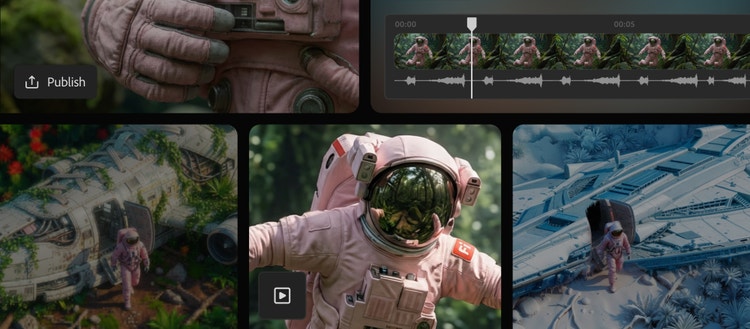Edit with Photoshop in ChatGPT
Anyone can now use Adobe apps in ChatGPT. Use Photoshop to edit photos, Express to create amazing designs and Acrobat to manage your documents — all free without leaving ChatGTP. Read more to learn how to get started.
Anyone can now use Adobe apps in ChatGPT. Use Photoshop to edit photos, Express to create amazing designs and Acrobat to manage your documents — all free without leaving ChatGTP. Read more to learn how to get started.


Now on Adobe.com, Frame.io is the one place to manage files, feedback, and edits for creative teams.
12-19-2025

Generate presentation, a new feature available as a preview in Adobe Express, Acrobat Studio and Acrobat AI Assistant, is designed to solve a familiar challenge: Staring at a blank slide and not knowing where to begin.
12-17-2025

Meta description: Adobe announces new Adobe Firefly video AI updates—adding precision “Prompt to Edit” and camera-motion controls, Topaz Astra upscaling in Firefly Boards, the public beta of Firefly video editor, and a new unlimited generations promotion for eligible Firefly plans through January 15
12-16-2025

Create holiday magic in Adobe Firefly
12-15-2025

Anyone can now use Adobe apps in ChatGPT. Use Photoshop to edit photos, Express to create amazing designs and Acrobat to manage your documents — all free without leaving ChatGTP. Read more to learn how to get started.
12-10-2025

The four creative trends that will define 2026 and how you can get started creating in Adobe Express
12-09-2025

Create for YouTube Shorts is now available in the Premiere mobile app.
12-08-2025

"Five creators reflect on receiving their anniversary pins at MAX 2025, sharing stories on first projects, evolving workflows, and decades of creative growth."
12-04-2025

With the debut of the new VNL, Volvo Trucks showcased the power of digital twins: delivering consistent, photoreal experiences across marketing, online configurators, and training tools. Backed by Substance 3D for high-fidelity materials, the digital launch sparked massive customer engagement and proved how accurate virtual products can accelerate decision-making and strengthen brand connection.
12-02-2025

These nonprofits are making an impact through powerful storytelling powered by Adobe’s nonprofit-focused program.
12-02-2025

Project Graph is Adobe’s new visual, node-based creative system that lets you design, connect, and share AI-powered workflows across Creative Cloud—giving creators real control, flexibility, and authorship in the age of generative AI.
11-25-2025

Create with Google Gemini 3 (with Nano Banana Pro) in Adobe Firefly and Photoshop. Generate high-quality images and refine them with Adobe’s powerful tools for free through Dec. 15.
11-20-2025